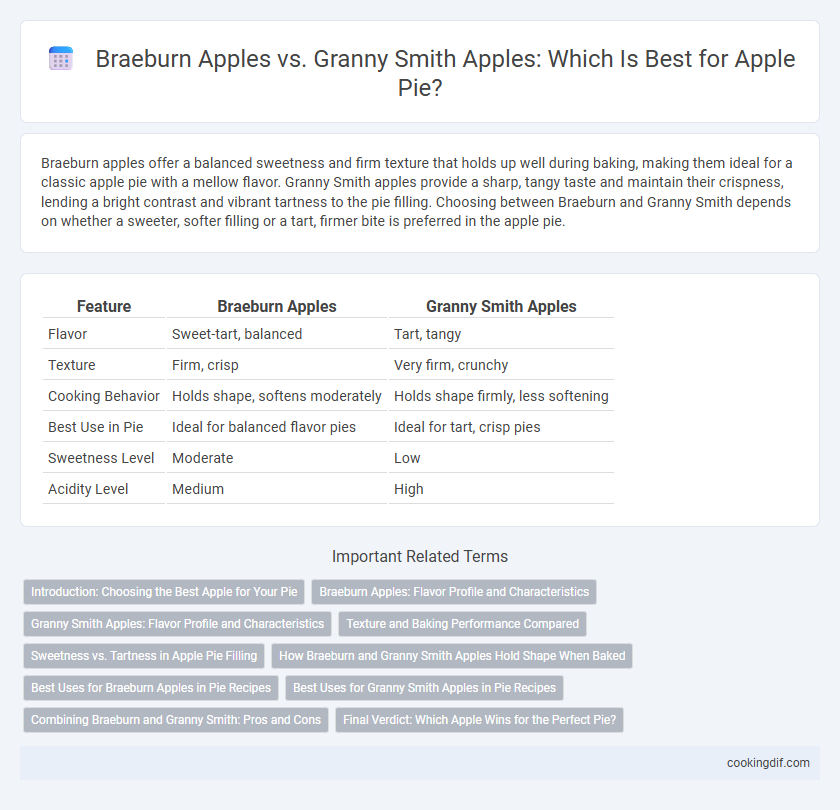Braeburn apples offer a balanced sweetness and firm texture that holds up well during baking, making them ideal for a classic apple pie with a mellow flavor. Granny Smith apples provide a sharp, tangy taste and maintain their crispness, lending a bright contrast and vibrant tartness to the pie filling. Choosing between Braeburn and Granny Smith depends on whether a sweeter, softer filling or a tart, firmer bite is preferred in the apple pie.
Table of Comparison
| Feature | Braeburn Apples | Granny Smith Apples |
|---|---|---|
| Flavor | Sweet-tart, balanced | Tart, tangy |
| Texture | Firm, crisp | Very firm, crunchy |
| Cooking Behavior | Holds shape, softens moderately | Holds shape firmly, less softening |
| Best Use in Pie | Ideal for balanced flavor pies | Ideal for tart, crisp pies |
| Sweetness Level | Moderate | Low |
| Acidity Level | Medium | High |
Introduction: Choosing the Best Apple for Your Pie
Braeburn apples offer a balanced sweetness and tartness with a firm texture that holds well during baking, making them ideal for apple pies that require a tender yet structured filling. Granny Smith apples provide a bright, tangy flavor and maintain their crispness throughout baking, perfect for pies that benefit from a pronounced tartness and a slightly firmer bite. Selecting between Braeburn and Granny Smith depends on whether a sweeter or more acidic profile is preferred for the desired pie flavor and texture.
Braeburn Apples: Flavor Profile and Characteristics
Braeburn apples offer a balanced sweet-tart flavor with hints of spice, making them ideal for apple pie fillings that require depth and complexity. Their firm texture holds up well during baking, preventing the pie from becoming soggy while maintaining tender slices. Braeburn's natural sweetness reduces the need for added sugar, enhancing the pie's overall aroma and taste.
Granny Smith Apples: Flavor Profile and Characteristics
Granny Smith apples are renowned for their tart, crisp flavor, making them an ideal choice for apple pie due to their ability to maintain texture and balance sweetness. Their firm flesh resists turning mushy during baking, providing a pleasing bite and contrast to sugary fillings. The bright acidity of Granny Smith apples enhances the overall flavor profile, preventing the pie from becoming overly sweet or cloying.
Texture and Baking Performance Compared
Braeburn apples offer a firm texture that holds up well during baking, providing a balanced softness without turning mushy. Granny Smith apples maintain a crisp bite and tartness when baked, enhancing the pie's structure and flavor contrast. The firmer Braeburn variety tends to create a denser filling, while Granny Smith delivers a lighter, more crisp pie texture.
Sweetness vs. Tartness in Apple Pie Filling
Braeburn apples offer a balanced sweetness with a subtle tartness, creating a well-rounded flavor in apple pie filling that caramelizes beautifully when baked. Granny Smith apples are distinctly tart, providing a sharp contrast that enhances the pie's overall brightness and prevents excessive sweetness. Combining Braeburn and Granny Smith apples in pie filling achieves an ideal harmony between sweet and tart, resulting in a complex and satisfying taste profile.
How Braeburn and Granny Smith Apples Hold Shape When Baked
Braeburn apples maintain a firm texture when baked, providing a balanced combination of sweetness and tartness that enhances pie filling without becoming mushy. Granny Smith apples excel in holding their shape due to their high acidity and dense flesh, resulting in a crisp bite and a tangy flavor that contrasts well with sweet pie crusts. Both varieties are favored for pies, but Braeburn offers a slightly softer, more nuanced consistency, while Granny Smith ensures a consistently firm texture throughout baking.
Best Uses for Braeburn Apples in Pie Recipes
Braeburn apples offer a balanced sweetness and firm texture that holds up well during baking, making them ideal for pies requiring a tender yet structured filling. Their slightly tart flavor enhances the overall taste without overpowering, providing depth and natural sweetness that complements spices like cinnamon and nutmeg. Braeburn apples maintain moisture and resist turning mushy, resulting in a pie with a perfect mix of softness and bite.
Best Uses for Granny Smith Apples in Pie Recipes
Granny Smith apples offer a tart and firm texture ideal for apple pies, providing a balanced contrast to the sweetness of sugar and spices. Their high acidity prevents the pie filling from becoming overly mushy, maintaining a desirable structure during baking. Unlike Braeburn apples, Granny Smiths excel in creating classic pies with a crisp bite and a bright, tangy flavor profile.
Combining Braeburn and Granny Smith: Pros and Cons
Combining Braeburn and Granny Smith apples in apple pie balances sweetness and tartness, creating a complex flavor profile that enhances the overall taste. Braeburn apples provide a firm texture and natural sweetness that contrasts with the sharp acidity and crispness of Granny Smith apples, resulting in a pie with varied bite and depth. The main drawback is that Braeburn apples soften more quickly during baking, which can affect the pie's consistency if not managed properly with proportion and baking time adjustments.
Final Verdict: Which Apple Wins for the Perfect Pie?
Braeburn apples offer a balanced sweetness and a firm texture that holds up well during baking, making them a top choice for pie lovers who prefer a naturally sweet flavor without added sugar. Granny Smith apples provide a tart, crisp bite that creates a classic contrast to sweet pie fillings, ideal for those who enjoy a tangy twist in every slice. The final verdict depends on personal taste: Braeburn excels in producing a sweeter, softer pie, while Granny Smith shines in delivering a vibrant, tart flavor that balances sweetness perfectly.
Braeburn apples vs Granny Smith apples for apple pie Infographic

 cookingdif.com
cookingdif.com